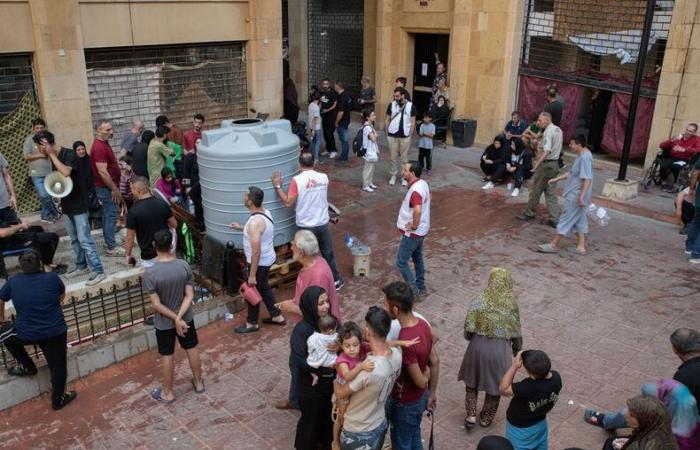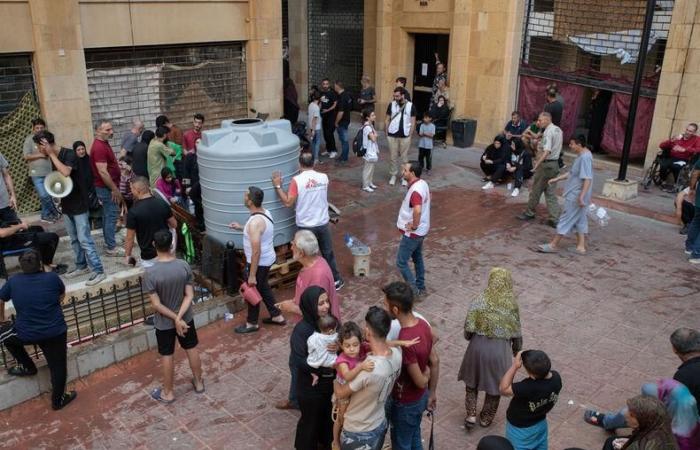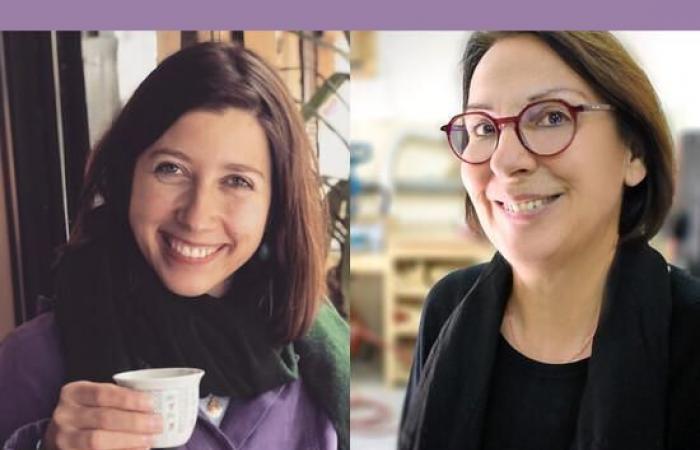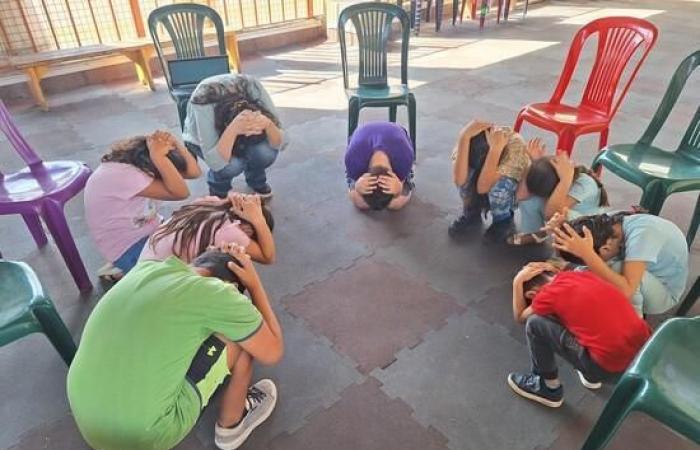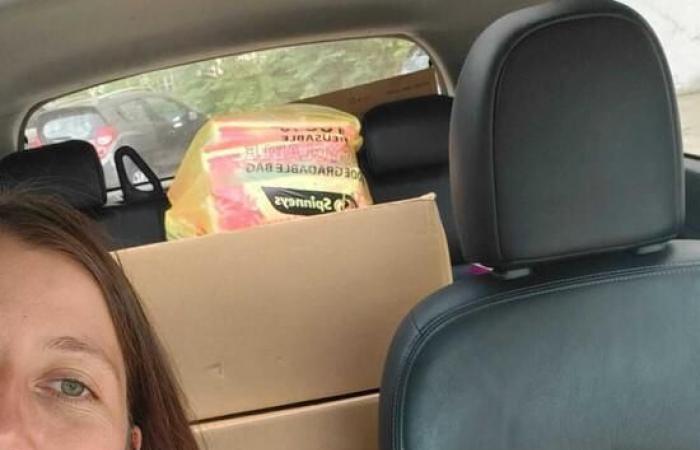Conflict in the Middle East –
They bear witness to the war from Beirut
Vanessa Zammar and Catherine Mourtada, two Swiss-Lebanese expatriates in Lebanon, have been living under Israeli bombing since September 2024. Stories.
Published today at 10:00 a.m.
Families of displaced people go to a water distribution organized by Doctors Without Borders in Beirut, October 11, 2024.
MSF/ANTONI LALLICAN – HANS LUCAS
Subscribe now and enjoy the audio playback feature.
BotTalk
This article from October 28, 2024 was imported from Femina.ch and republished on our site on January 7, 2025.
“Here’s some news, we have more and more work, daily life is trying and it’s sometimes difficult to find the time to put my thoughts in order. The bombings continued, from southern Lebanon to Beirut, leaving behind destruction and desolation.” This message was sent on Tuesday October 22, 2024 by Catherine Mourtada, a Swiss-Lebanese woman who has lived in the southern suburbs of Beirut for more than 30 years.
This region has been under numerous Israeli bombardments for more than a month, just like the center of Beirut and other localities in the country. If the hostilities had begun in the south, after the start of the war led by Israel in Gaza which has already claimed more than 42,000 lives, the intensification of airstrikes throughout the country since September has created an even more catastrophic situation for civilians. -es.
At this point you will find additional external content. If you accept that cookies are placed by external providers and that personal data is thus transmitted to them, you must allow all cookies and display external content directly.
Allow cookiesMore info
Since October 8, 2023, the day after the attacks committed by Hamas, 2,412 people have been killed in Lebanon, including around 1,500 since September 23, 2024, and 11,285 people have been injured, according to an October 17 count from the Lebanese Ministry of public health. This conflict has also resulted in the displacement of 1.2 million people across the country. L’ONU and NGOs on site, such as Doctors Without Borders (MSF) or Land of menare alarmed by the situation and provide essential humanitarian aid.
Among the civilians, two Swiss-Lebanese women, Catherine Mourtada and Vanessa Zammar, expatriates in Beirut and its southern suburbs, talk about their daily lives since the dramatic worsening of the situation in recent months. “We were already all extremely shocked by the horrors that happened in Gaza following the events of October 7 (editor’s note: the Hamas attack in Israel left 1,205 dead) and which are still continuing today. hui,” says Catherine Mourtada, who was a teacher at Mont-sur-Lausanne until her arrival in Lebanon in 1988. Subsequently, she co-founded the NGO That’s itlocated in the southern suburbs of Beirut, in the very poor district of Hay el-Gharbi. She is currently director of the educational center.
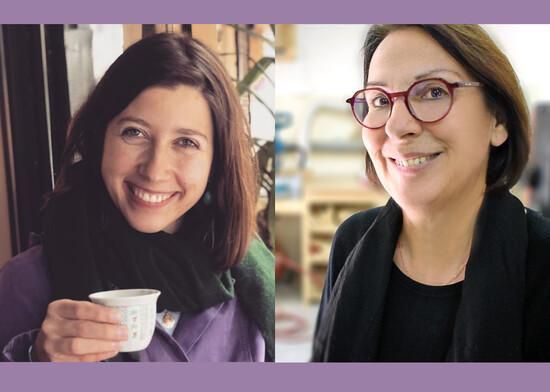
Vanessa Zammar and Catherine Mourtage. Two Swiss-Lebanese expatriates in Beirut.
DR
“Before September, we already felt concerned, through the stories of our relatives whose family lives in the south,” says Vanessa Zammar, who has lived in Beirut since 2018. Originally from Nyon, she now lives in the neighborhood. Christian from Achrafieh. In 2021, she co-founded the collective Jeyetnawhich fights against menstrual poverty in Lebanon.
Terrified population
Both women remember feeling a profound upheaval on September 17, 2024when Israel simultaneously detonated Hezbollah members’ pagers, then their walkie-talkies, the next day, leaving 37 dead and more than 3,500 injured, according to the Lebanese Minister of Health, Firass Abiad.
“The atmosphere was heavy, in one day there were so many injured, who were amputated or who lost an eye, the hospitals were overwhelmed. A doctor friend told me he had carried out 400 operations in one week,” says Catherine Mourtada.
“It took a while to understand what was happening. There was a nervousness in the air. My notifications spoke of 10 injuries, then 100, then 1000. Such changes in the numbers never happen so quickly, and it was truly mind-blowing to experience. But that’s what they wanted: to terrify the population. And I have the impression that in Switzerland and in Europe, no one realized to what extent this had severely impacted the civilian population,” recalls Vanessa Zammar.
A few days later, September 23Israeli airstrikes intensified across the country, also targeting Beirut and its southern suburbs. “We were never able to return to school, 80% of the children are now displaced, just like 70% of our teachers,” laments the educational director of Tahaddi. The homes of five teachers were also destroyed or seriously damaged.
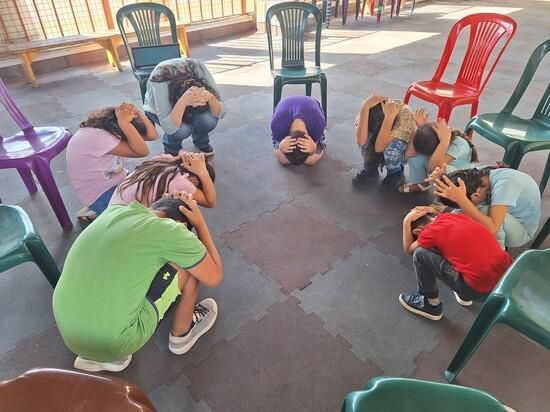
Students from the Tahaddi Foundation learn how to protect themselves in the event of a bombing, in October 2024.
DR
Since then, members of the foundation still on site have been helping local residents and displaced families: “We pay for meals provided by a partner association and we make blankets, pillows and beds for people in need. “.
For a week, school work has been sent by WhatsApp to the center’s students, which allowed “teachers and children to reconnect with a semblance of routine.” Catherine Mourtada has already experienced two other wars in Lebanon ( the end of the civil war and that of 2006), but she points to a different situation: “This one is much harsher, meaner, dehumanizing.”
Show life
Vanessa Zammar, with her association, distributes disposable menstrual pads by the thousands. “The rules don’t stop during war,” she argues. Before the conflict intensified, she and Jeyetna organized discussion circles around menstrual experiences and workshops to discuss and distribute different types of periodic products (washable pads, menstrual panties, cups, etc.). “Now we are unfortunately at ground zero in our activism, as government inaction and slow action by major organizations force us to focus on mass emergency aid.”
The 30-year-old remembers strong moments, like the sight of black smoke above Beirut: “When you see that, you can only cry, again and again.” It also evokes the sound of drones flying over the territory or even planes breaking the sound barrier. “This creates noises that frighten the population, when we think back to the dramatic explosion of 2020.”

Vanessa Zammar in her car with boxes full of sanitary napkins ready to be distributed.
DR
It is important for her to show who is behind the smoke and destroyed buildings. She regularly publishes selfies and photos of her daily life on social networks, such as when she drinks coffee on her balcony. “It is important to show the people and places behind these atrocities and that life goes on, despite everything!”
“Latest news”
Want to stay on top of the news? “24 Heures” offers you two appointments per day, directly in your email box. So you don’t miss anything that’s happening in your Canton, in Switzerland or around the world.
Other newsletters
Log in
Did you find an error? Please report it to us.
0 comments

